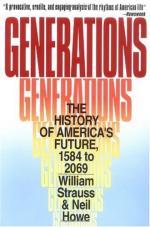
|
| Name: _________________________ | Period: ___________________ |
This test consists of 15 multiple choice questions and 5 short answer questions.
Multiple Choice Questions
1. What alternates between secular crises and spiritual awakenings?
(a) Interactive critcal events.
(b) Generational phases.
(c) Corresponding idealism.
(d) Social Moments.
2. What was one of the social moments of the Colonial Cycle?
(a) The Enlightenment Revolution.
(b) The Glorious Generation.
(c) The Glorious Revolution.
(d) The Enlightenment Generation.
3. What element distinguishes a generation as a cohesive cohort-group with its own unique biography?
(a) Social moments.
(b) Lifecycle.
(c) Constellation.
(d) Peer personality.
4. How might a cataclysm affect a 10-year-old?
(a) He'd find it terrifying.
(b) He'd find it inspiring.
(c) He'd find it calming.
(d) He'd find it incomprehensible.
5. How many G.I. Presidents were there?
(a) 6.
(b) 9.
(c) 7.
(d) 8.
6. What year were the first G.I. babies born?
(a) 1910.
(b) 1901.
(c) 1905.
(d) 1915.
7. In the 1970s, what image did movie makers emphasis?
(a) Dissolution of teens.
(b) Abandonment of the elderly.
(c) Distressed childhood.
(d) Corruption of government.
8. What are the dates of the Armada Crisis?
(a) 1579-1587.
(b) 1580-1588.
(c) 1582-1590.
(d) 1581-1589.
9. Who said, "You don't need to be shot down from the sky to know the world is a dangerous place"?
(a) Jim Thompson.
(b) Micheal Dukakis.
(c) George Bush.
(d) John Kennedy.
10. Who wrote The Seasons of a Man's Life?
(a) Cheryl Merser.
(b) Daniel Levinson.
(c) Erik Erikson.
(d) Gail Sheehy.
11. Who wrote Passages?
(a) Cheryl Merser.
(b) Daniel Levinson.
(c) Erik Erikson.
(d) Gail Sheehy.
12. What is the central role of elderhood?
(a) Leadership.
(b) Dependence.
(c) Activity.
(d) Stewardship.
13. What is it called when society focuses on changing the inner world of values and private behavior?
(a) Spiritual awakening.
(b) Social moment.
(c) Consciousness Revolution.
(d) Secular crisis.
14. How might a cataclysm affect a 70-year-old?
(a) He'd find it incomprehensible.
(b) He'd find it inspiring.
(c) He'd find it terrifying.
(d) He'd find it calming.
15. What are the dates for the Reformation Awakening?
(a) 1516-1538.
(b) 1517-1539.
(c) 1515-1540.
(d) 1518-1541.
Short Answer Questions
1. To propel the generational cycle in the authors' proposed manner, how must a secular crisis end?
2. Who was a rising-adult leader during the Glorious Revolution crisis?
3. According to Figure 2-2, how were midlife people viewed in 1964?
4. Children are unfortunate to be born in which era?
5. Who was King James's hand picked New England governor in 1689?
|
This section contains 347 words (approx. 2 pages at 300 words per page) |

|




